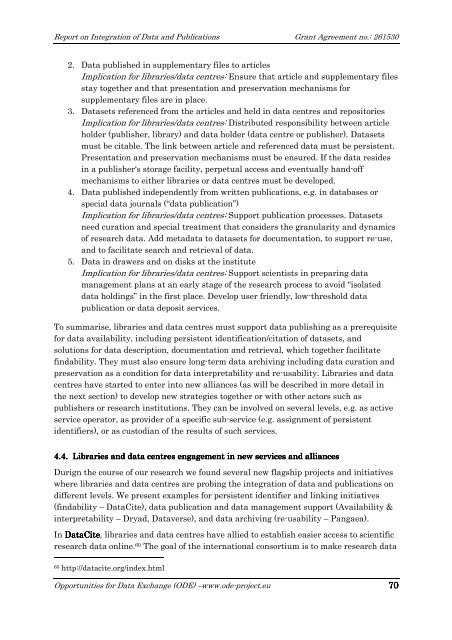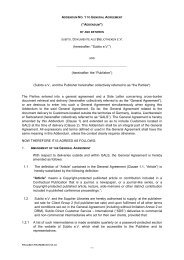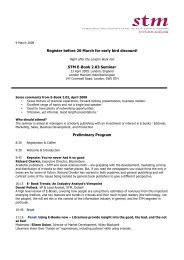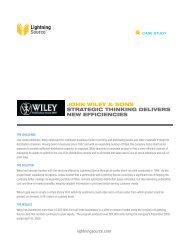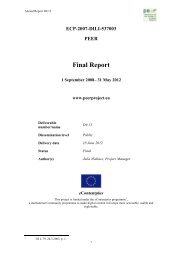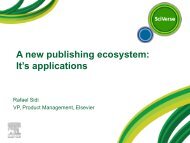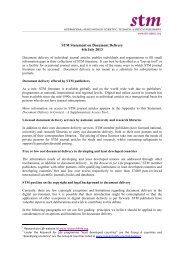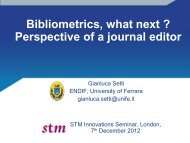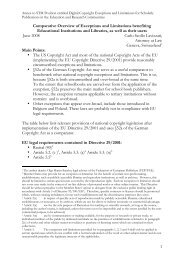Integration of Data and Publications - Alliance for Permanent Access
Integration of Data and Publications - Alliance for Permanent Access
Integration of Data and Publications - Alliance for Permanent Access
Create successful ePaper yourself
Turn your PDF publications into a flip-book with our unique Google optimized e-Paper software.
Report on <strong>Integration</strong> <strong>of</strong> <strong>Data</strong> <strong>and</strong> <strong>Publications</strong> Grant Agreement no.: 261530<br />
2. <strong>Data</strong> published in supplementary files to articles<br />
Implication <strong>for</strong> libraries/data centres: Ensure that article <strong>and</strong> supplementary files<br />
stay together <strong>and</strong> that presentation <strong>and</strong> preservation mechanisms <strong>for</strong><br />
supplementary files are in place.<br />
3. <strong>Data</strong>sets referenced from the articles <strong>and</strong> held in data centres <strong>and</strong> repositories<br />
Implication <strong>for</strong> libraries/data centres: Distributed responsibility between article<br />
holder (publisher, library) <strong>and</strong> data holder (data centre or publisher). <strong>Data</strong>sets<br />
must be citable. The link between article <strong>and</strong> referenced data must be persistent.<br />
Presentation <strong>and</strong> preservation mechanisms must be ensured. If the data resides<br />
in a publisher‘s storage facility, perpetual access <strong>and</strong> eventually h<strong>and</strong>-<strong>of</strong>f<br />
mechanisms to either libraries or data centres must be developed.<br />
4. <strong>Data</strong> published independently from written publications, e.g. in databases or<br />
special data journals (“data publication”)<br />
Implication <strong>for</strong> libraries/data centres: Support publication processes. <strong>Data</strong>sets<br />
need curation <strong>and</strong> special treatment that considers the granularity <strong>and</strong> dynamics<br />
<strong>of</strong> research data. Add metadata to datasets <strong>for</strong> documentation, to support re-use,<br />
<strong>and</strong> to facilitate search <strong>and</strong> retrieval <strong>of</strong> data.<br />
5. <strong>Data</strong> in drawers <strong>and</strong> on disks at the institute<br />
Implication <strong>for</strong> libraries/data centres: Support scientists in preparing data<br />
management plans at an early stage <strong>of</strong> the research process to avoid “isolated<br />
data holdings” in the first place. Develop user friendly, low-threshold data<br />
publication or data deposit services.<br />
To summarise, libraries <strong>and</strong> data centres must support data publishing as a prerequisite<br />
<strong>for</strong> data availability, including persistent identification/citation <strong>of</strong> datasets, <strong>and</strong><br />
solutions <strong>for</strong> data description, documentation <strong>and</strong> retrieval, which together facilitate<br />
findability. They must also ensure long-term data archiving including data curation <strong>and</strong><br />
preservation as a condition <strong>for</strong> data interpretability <strong>and</strong> re-usability. Libraries <strong>and</strong> data<br />
centres have started to enter into new alliances (as will be described in more detail in<br />
the next section) to develop new strategies together or with other actors such as<br />
publishers or research institutions. They can be involved on several levels, e.g. as active<br />
service operator, as provider <strong>of</strong> a specific sub-service (e.g. assignment <strong>of</strong> persistent<br />
identifiers), or as custodian <strong>of</strong> the results <strong>of</strong> such services.<br />
4.4. Libraries <strong>and</strong> data centres engagement in new services <strong>and</strong> alliances<br />
Durign the course <strong>of</strong> our research we found several new flagship projects <strong>and</strong> initiatives<br />
where libraries <strong>and</strong> data centres are probing the integration <strong>of</strong> data <strong>and</strong> publications on<br />
different levels. We present examples <strong>for</strong> persistent identifier <strong>and</strong> linking initiatives<br />
(findability – <strong>Data</strong>Cite), data publication <strong>and</strong> data management support (Availability &<br />
interpretability – Dryad, <strong>Data</strong>verse), <strong>and</strong> data archiving (re-usability – Pangaea).<br />
In <strong>Data</strong>Cite, libraries <strong>and</strong> data centres have allied to establish easier access to scientific<br />
research data online. 60 The goal <strong>of</strong> the international consortium is to make research data<br />
60 http://datacite.org/index.html<br />
Opportunities <strong>for</strong> <strong>Data</strong> Exchange (ODE) –www.ode-project.eu 70


